A Union Soldier’s Letter to His Wife
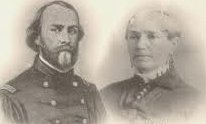 Image: Sullivan and Sarah Ballou
Image: Sullivan and Sarah Ballou
Sarah Ballou’s husband, Sullivan, left his family, law practice and a promising political career to enlist in the Union Army. On July 14, 1861, Sullivan Ballou wrote a poignant letter to his wife, expressing his love for her and his patriotism toward his country. A week later he fought in the first battle of the Civil War at Bull Run. Sarah would not see this letter for many months.
Sarah Hart Shumway was born on February 26, 1837 in Worcester, Massachusetts to Christopher Columbus and Catharine Fowler Shumway. Sullivan Ballou was born March 28, 1829 in Smithfield, Rhode Island to Hiram and Emeline Bowen Ballou. He lost both of his parents at a young age, and struggled to fend for himself.
Ballou was educated at Phillips Academy in Andover, Massachusetts; Brown University in Providence, Rhode Island; and studied law at the National Law School in Ballston, New York. Ballou was admitted to the Rhode Island Bar in 1853 and began his law practice the same year. He was elected in 1854 as clerk of the Rhode Island House of Representatives, later serving as Speaker of the House.
Sarah Hart Shumway, described as intelligent and proper, married Sullivan Ballou on October 15, 1855, and they lived in Smithfield, Rhode Island. The following August Sarah gave birth to their first child, Edgar. A second son, William, was born in 1859. By all accounts, Sullivan and Sarah’s marriage was a very happy one.
In 1861 Sullivan Ballou was 32, had a prosperous law practice, and a thriving political career. He also had great respect for Abraham Lincoln and, when the president called for volunteers to put down the Southern rebellion, Ballou immediately volunteered for military service and became judge advocate of the Rhode Island militia and a major in the 2nd Rhode Island Infantry Regiment.
The Letter
Arriving in Washington, DC on June 22, 1861, the 2nd Rhode Island was incorporated into Colonel Ambrose Burnside‘s brigade, and spent the next four weeks training. During this time, Ballou wrote as often as he could to Sarah, expressing time and again his love for her. On July 14, 1861, he wrote from Camp Clark in Washington, DC:
My very dear Sarah:
The indications are very strong that we shall move in a few days – perhaps tomorrow. Lest I should not be able to write again, I feel impelled to write a few lines that may fall under your eye when I shall be no more… If it is necessary that I should fall on the battlefield for my country, I am ready. I have no misgivings about, or lack of confidence in, the cause in which I am engaged, and my courage does not halt or falter.I know how strongly American Civilization now leans upon the triumph of the Government, and how great a debt we owe to those who went before us through the blood and suffering of the Revolution. And I am willing – perfectly willing – to lay down all my joys in this life, to help maintain this Government, and to pay that debt.
But, my dear wife, when I know that with my own joys I lay down nearly all of yours, and replace them in this life with cares and sorrows… I have sought most closely and diligently and often in my heart for a wrong motive in thus hazarding the happiness of those I love, and I could find none. A pure love of my Country and of the principles I have so often advocated before the people – the name of honor, that I love more than I fear death, has called upon me, and I have obeyed.
Sarah, my love for you is deathless, it seems to bind me to you with mighty cables that nothing but Omnipotence could break; and yet my love of Country comes over me like a strong wind and bears me irresistibly on with all these chains to the battlefield.
The memories of the blissful moments I have spent with you come creeping over me, and I feel most gratified to God and to you that I have enjoyed them for so long. And hard it is for me to give them up and burn to ashes the hopes of future years, when, God willing, we might still have lived and loved together, and seen our sons grown up to honorable manhood around us.
I have, I know, but few and small claims upon Divine Providence, but something whispers to me – perhaps it is the wafted prayer of my little Edgar, that I shall return to my loved ones unharmed. If I do not my dear Sarah, never forget how much I love you…
If the dead can come back to this earth and flit unseen around those they loved, I shall always be near you; in the gladdest days and in the darkest nights… and if there be a soft breeze upon your cheek, it shall be my breath, as the cool air fans your throbbing temple, it shall be my spirit passing by.
Sarah do not mourn me dead; think I am gone and wait for thee, for we shall meet again. As for my little boys… Willie is too young to remember me long, and my blue-eyed Edgar will keep my frolics with him among the dimmest memories of his childhood. Sarah, I have unlimited confidence in your maternal care and your development of their characters. Tell my two mothers his and hers I call God’s blessing upon them.
O Sarah, I wait for you there! Come to me, and lead thither my children.
Sullivan
A day or two later the 2nd Rhode Island was one of the dozens of green regiments moving out of the capital as part of General Irvin McDowell‘s army, headed for the Confederate lines at Bull Run in northern Virginia. McDowell’s plan of attack was for a portion of his army to demonstrate in the Rebel front, while the main Union attack column swung far to the right, and then moved around behind the Southern left flank.
The Battle
Burnside’s brigade was combined with that of Colonel Andrew Porter to create a small division that was selected to be in the van of the flanking movement. On the morning of July 21, 1861, five companies of the 2nd Rhode Island heralded the advance, spreading out as skirmishers on both sides of the Manassas-Sudley Road. To the left was Matthews Hill, and as the skirmishers cautiously moved toward the summit, they received their first hostile shots from a South Carolina brigade.
Burnside quickly shifted his men to the left of the road to meet the threat, forming the balance of the 2nd in a battle line and ordering them up the hill behind the skirmishers. The disorganized but enthusiastic Rhode Islanders reached the crest of the hill recently abandoned by the outnumbered Rebel skirmish line. The Carolinians, however, had not given up the field; they greeted the Rhode Islanders with another volley.
In order to better direct his men, Ballou rode his horse to the front of his regiment, turning his back to the Confederates. At that point, a six-pound cannon ball, probably fired by a gun of the Lynchburg Artillery, tore off his right leg and killed his horse. The stricken major was then carried to the field hospital at Sudley Church, where army surgeons amputated the remainder of Ballou’s shattered leg.
The morning’s fight had gone to the Federals. That afternoon, however, a Confederate counterattack sent the Union troops fleeing back to Washington, and the fight ended as a Southern victory. The 2nd Rhode Island took little part in the afternoon battle, remaining in reserve and licking its wounds with Burnside’s brigade. The regiment had suffered heavily: 93 of its men were mortally wounded at Bull Run.
Ballou, too badly wounded to move during the Federal retreat, was left behind in the care of army surgeons. Newspapers erroneously reported that he had been killed on the battlefield. However, Ballou died of wounds received at the Battle of Bull Run on July 28, 1861, at age 32. He was buried in the yard of nearby Sudley Church.
The Aftermath
In early March 1862, word reached Washington that the Confederates were abandoning their lines around Bull Run to protect Richmond from the Army of the Potomac’s advance up the peninsula. Soon thereafter Rhode Island Governor William Sprague (who would later marry Washington socialite Kate Chase) and a band of 70 others went to retrieve the bodies of Rhode Island officers left behind after the battle the previous summer.
Ballou’s body was never recovered, but charred ash and bone believed to be his remains were found and buried with full military honors in Swan Point Cemetery, Providence, Rhode Island, on a gray and stormy March 31, 1862.
Although Sarah Ballou received other letters from her husband dated later, his letter of July 14, 1861 was never mailed. Ballou might have deliberately left it among his personal effects, knowing that, if he were killed in battle, Sarah would find the letter among his belongings when they were eventually shipped home. And, according to the story, that is how she came to find it.
Sarah Ballou, who was only 24 years old when her husband was killed, never remarried. She raised her two sons alone, supporting her family with a government pension of $29 per month and the money she earned by giving piano lessons. In 1875, she became the secretary of the Providence public school system, where she served until 1899. She then moved to East Orange, New Jersey to be near her son William.
Sarah Ballou died at East Orange, New Jersey on April 19, 1917 at age 80, and was laid to rest beside her husband in Swan Point Cemetery in Providence. The original copy of the letter Sullivan Ballou wrote to Sarah a week before the First Battle of Bull Run has never been found and, according to one story, it was buried with her.
Handwritten copies of the letter were made and deposited in a number of libraries or archives around the country. One of those copies was found in the early 1980s in the Illinois State Historical Library by Pulitzer prizewinner Don Fehrenbacher, now a professor of history emeritus at Stanford University. He later sent a copy of the letter to Ken Burns who was then in the process of beginning his vast Civil War project, and Burns was delighted.
On September 23, 1990, Ken Burns’ mini-series documentary, The Civil War, made its debut on PBS and became immensely popular. However, the moment that defined the series and touched the hearts of viewers across the nation took place at the end of the first episode, when narrator David McCullough introduced Paul Roebling’s reading of a letter, written by an obscure volunteer major from Rhode Island to his wife.
SOURCES
Wikipedia: Sullivan Ballou
PBS.org: Sullivan Ballou Letter
Dear Sarah: The Sullivan Ballou Letter
Historynet: Sullivan Ballou: The Macabre Fate of a American Civil War Major
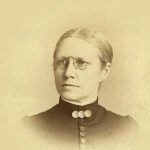
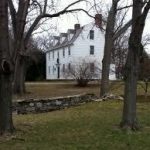
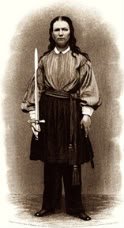
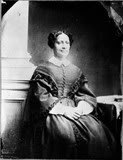

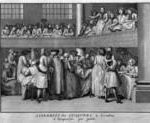
Thank you for the image of Major Sullivan Ballou and his Aunt Sarah. This is not his wife. There are no known images of the woman he loved so passionately. This is an old mistake by a well meaning but not top class Rhode Island historian.